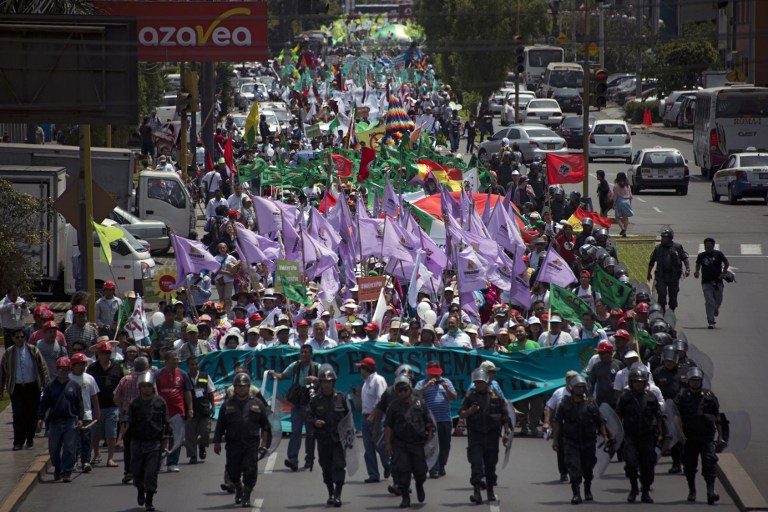SUMMARY
This is AI generated summarization, which may have errors. For context, always refer to the full article.

MANILA, Philippines (UPDATED) – Philippine civil society organizations advocating for more aggressive policies on climate change were bothered by a “glaring” shift in the Philippine delegation’s emphasis during the recently concluded United Nations climate negotiations in Lima, Peru.
The Philippine delegation surprised even foreign delegations and civil society groups when it accepted a crucial draft decision as is, without calling for the inclusion of concepts it had fought for in the past climate talks.
Specifically, the delegation left out calls for “common but differentiated responsibility” (CBDR) and “loss and damage mechanism” to be included in the text of the draft decision.
“The reaction was immediate. There was a sense of ‘What’s happening?’ because the Philippines was the developing country that was a leader in that push,” Voltaire Alferez, national coordinator of the climate coalition Aksyon Klima, told Rappler on Thursday, December 18.
It happened during the December 13 plenary of the ad hoc working group on the Durban Platform, one of the crucial events before the talks ended on Sunday, December 14.
During the plenary, attended by all delegations and most civil society groups, the co-chairpersons of the groups presented the draft decision – a summary of all discussions made by the group during the talks.
The Durban Platform is one of the most important negotiation tracks of the talks. It tackles climate change mitigation – the world’s strategy to reduce greenhouse gas emissions that drive the warming of the planet.
The heated discussion on the Durban Platform was among the reasons why the talks extended. It was originally scheduled to end on Friday, December 12.
Most developing countries began their speeches by calling for the inclusion of the two principles into the text. But the Philippine delegation, represented by the Department of Foreign Affairs’ Val Roque, accepted the text as is after pushing for human rights to be included in the text.
Most groups, including Aksyon Klima, support the call for climate change to be treated as a human rights issue. But they were surprised the Philippines failed to call out the text for its omission of those two principles.
Val Roque, who got back to Rappler on Thursday evening, pointed out that he in fact did mention the delegation’s concern for the absence of loss and damage to the draft decision text.
While he admitted not mentioning CBDR, he said that Climate Change Commissioner Lucille Sering underscored the importance of CBDR in her High Level Ministerial Statement.
“Delegation’s statements in Lima must be seen as a whole,” said Roque.
Alferez countered that though loss and damage was mentioned, the delegation still accepted the draft decision text without calling more aggressively for it to be changed.
‘Shift in tone’
The lack of emphasis and consistency indicated a “shift in tone and emphasis” on the part of the Philippine delegation, which traditionally was aggressive on CBDR and loss and damage, said Alferez who attended the conference.
In fact, it was the Philippine delegation that had been largely responsible for the crafting of the Warsaw Mechanism on Loss and Damage in the Warsaw talks in 2013.
Most developing countries, except the Marshall Islands and Small Island Developing States, called for these two concepts in their speeches.
The concept of CBDR points out that countries that historically contributed the most greenhouse gas emissions due to the way they industrialized – like the United States, Japan and the European Union – are obligated to cut down on greenhouse gas emissions.
Poorer, developing countries like the Philippines may cut down their emissions but are not legally-bound to do so since they have minuscule contribution to emissions.
CBDR is enshrined in the United Nations Framework Convention on Climate Change (UNFCC) and in the Philippine Climate Change Act.
The concept of loss and damage calls for a mechanism to compensate poorer nations for impacts of climate change that can no longer be addressed by adaptation or mitigation – impacts like devastating typhoons.
PH caving to pressure?
Even before the Lima talks began, it became controversial for the Philippine delegation when its most visible negotiator, Naderev “Yeb” Saño, was noticeably missing from the conference.
Saño is the lead negotiator for the ad hoc working group on the Durban Platform and has had years of experience and knowledge on CBDR and loss and damage. He has been the country’s lead negotiator for the talks since 2010 and attended his first talk in 2006.
His absence sparked the use of the hashtag #YebInLima among local and foreign advocacy groups.
But he wasn’t the only one missing in action. Two other top negotiators, Agriculture Undersecretary Fred Serrano and retired diplomat Bernarditas Muller (who was among those who negotiated the landmark UNFCCC 22 years ago), were noticeably absent.
Both are staunch advocates of CBDR. Serrano was the country’s lead negotiator on loss and damage in the Doha conference in 2012.
The fact that these negotiators were not present at the talks along with the change in stance of the delegation has sparked the suspicion of civil society groups.
“The immediate question is: has the Philippines caved in to pressure from its developed partner allies?” wondered Alferez.
Major emitting nations like the US, Canada, and Australia have balked at legally-binding emission reduction targets and were vocal against the loss and damage mechanism during the Warsaw talks. – Rappler.com
Add a comment
How does this make you feel?
There are no comments yet. Add your comment to start the conversation.